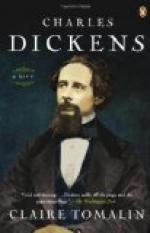So, little thinking how soon he would begin to regard the “emolument” as ludicrously inadequate, he set to work on “Pickwick.” The first part was published on the 31st of March or 1st of April, 1836.
That part seems scarcely to have created any sensation. Mr James Grant, the novelist, says indeed, that the first five parts were “a dead failure,” and that the publishers were even debating whether the enterprise had not better be abandoned altogether, when suddenly Sam Weller appeared upon the scene, and turned their gloom into laughter. Be that as it may, certain it is that before many months had passed, Messrs. Chapman and Hall must have been thoroughly confirmed in a policy of perseverance. “The first order for Part I.,” that is, the first order for binding, “was,” says the bookbinder who executed the work, “for four hundred copies only.” The order for Part XV. had risen to forty thousand. All contemporary accounts agree that the success was sudden, immense. The author, like Lord Byron, some twenty-five years before, “awoke and found himself famous.” Young as he was, not having yet numbered more than twenty-four summers, he at one stride reached the topmost height of popularity. Everybody read his book. Everybody laughed over it. Everybody talked about it. Everybody felt, confusedly perhaps, but very surely, that a new and vital force had arisen in English literature.
And English literature just then was in one of its times of slackness, rather than full flow. The great tide of the beginning of the century had ebbed. The tide of the Victorian age had scarcely begun to do more than ripple and flash on the horizon. Byron was dead, and Shelley and Keats and Coleridge and Lamb; Southey’s life was on the decline; Wordsworth had long executed his best work; while of the coming men, Carlyle, though in the plenitude of his power, having published “Sartor Resartus,” had not yet published his “French Revolution,"[11] or delivered his lectures on the “Heroes,” and was not yet in the plenitude of his fame and influence; and Macaulay, then in India, was known only as the essayist and politician; and Lord Tennyson and the Brownings were more or less names of the future.




